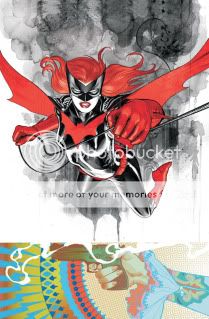
Detective Comics #854-860
Greg Rucka, writer
J.H. Williams III, artist
DC, 2009-2010
24 story pages each
$3.99 each
I’ll admit it, I was too hard on Detective Comics. I always understood, and agreed with, every word of praise offered for J.H. Williams III’s almost comically proficient art, mind you. You don’t need me to go over that, Jog handled it nicely. It’s just that beyond the art…well, I didn’t think there was anything beyond the art.
Maybe it’s that Question back-up that threw me, with the erstwhile Renee Montoya adopting the exact same crimefighting set-up as the lead feature’s star, i.e. beautiful lesbian with military and/or law-enforcement training adopts the mantle of a male superhero while her old-man sidekick sits at a computer back at HQ. And it’s not exactly as if either of them are the only strong-women-also-cry tough gals Rucka’s ever written. Meanwhile, some past Rucka plot points I never really got into come along for the ride, most prominently the convoluted Religion of Crime and its Batwoman-obsessed prophecies. I liked that idea when it was tied directly into Darkseid–the more other stuff that it hooked up with, from Vandal Savage to some old Rucka characters to the actual Bible, the less compelling I found it.
On a more fundamental level I think I’m just a lot less interested in superhero comics as fed through the filter of writers who’ve read, watched, and written a lot of spy and crime fiction over the past decade. What was once a thrilling deviation–seriously, The Ultimates, Sleeper, Gotham Central and the Daredevil/Alias/Powers trifecta blew my mind once upon a time–is now the default. Over at Marvel you’re seeing, or you will be seeing, I think, that noir/black-ops framework give way to a bold new era defined by loosey-goosier writers like Matt Fraction and Jonathan Hickman; Ed Brubaker’s given a pass because that really is the perfect place for a postmillennial Captain America to be. At DC, that kind of stuff doesn’t interest the main moneymakers and ship-steerers, Geoff Johns and Grant Morrison, in the slightest. And though I’m far less militant (heh) about this point than other readers I know, there’s always the suspicion that shoehorning superheroes and their fantastical fiction into exciting but reality-based counterpart activities like law enforcement and espionage and organized crime is a way to strip them of the weirdness and wonder even the worst of them usually contain–to polish them up even while darkening them up, to smooth out the angles and make them action-franchise-friendly. So for all those reasons there’s a degree to which I’ve had my fill of books in which characters nonchalantly drop military argot in conversation and suchlike, and thus I’m a tough nut for Rucka’s writing in ‘Tec to crack.
But after taking the opportunity to read all seven issues of the “Batwoman in Detective Comics” run, I’ve realized just how far short I was selling it. Is the story a game-changer, a brain-melter? No. But it’s a good deal wilder and weirder and, yes, more wondrous than your average spandex-turned-kevlar effort. And shame on me for not seeing how Williams’s art, far from an Avatar-style silk hat on a pig, draws on and enhances Rucka’s strongest stuff while muting the weaker elements. Simply put, how did I miss how very Hot Topic the whole “pale redheaded lesbian dresses up like an S&M vampire and does battle with her pale loligoth Satan-worshipping evil twin sister who dresses like Alice in Wonderland” thing is? It’s a very glam, very goth, very fetishy, very fun set-up, hammered home with Williams’s dark psychedelia, polymorphous mimickry (that extended Mazzucchelli impersonation is really breathtaking) and (you don’t hear much about this, but for real) dazzling good-girl art.
What’s more, this is actually some of my favorite Rucka writing I’ve come across. You know how most superheroes have a two-stage origin? Batman’s parents are killed, and the bat flies through his window; Spider-Man gets bitten by the spider, and his Uncle gets killed; Superman’s home planet blows up, and he’s raised in all-American fashion by his kindly adoptive parents? Batwoman’s mother and sister are killed, and then she gets Don’t Ask Don’t Tell’d out of the military. She’s not just gay–homophobia is a foundational trauma for her. I love it. I also really like the air of doomed glamour, to use a favorite phrase of mine of late, with which Rucka imbues the whole affair. Batwoman’s bright-red trimmings seem like war paint she puts on to power past the sense that this was all a terrible, terrible idea. Rucka knows the power of pointed silences and fade-outs, all of which are painstakingly choreographed by Williams, using disembodied panel boxes to pinpoint moments in the comics equivalent of slow motion. When we suddenly see Alice’s tear-streaked mascara emphasized during her fight with Batwoman’s father, when Alice falls across the top and down the right hand side of a climactic spread with a great gulf of ocean mutely occupying the rest of the pages–it means something. I can already hear the Moore-derived derision that none of this has any echo in any one’s real life, but even if that’s true, who cares? It’s violent, it’s sexy, it’s spectacular–just what I want from my superhero comics.
Tags: comics, comics reviews, Comics Time, reviews

I’m wondering if you haven’t just ruined my reread. I planned to go in and look much harder at the strengths of Rucka’s writing this time around, but it seems to me that you’ve pretty much captured everything I’m likely to get out of it.
You’ve enhanced my reread. The art has been so fantastic that I’m likely to pick up the inevitable hardcover, too (a rare move on my part, but it was worth it with Promethea, so …), and give it a proper reading then. The two-stage origin and particularly the “hot topic” observation strike me as really sharp and will really contribute to my enjoyment.
Zom: Um…You’re…welcome?
Guy: Thanks!